
Every family that celebrates Christmas has its own traditions -- fictional families included. Some celebrations, characterized by roaring fires and creaking tables of mince pies and steaming turkey, capture the aspirational heart of the Christmas spirit. Other fictional holidays paint the gray disappointment that can accompany a lackluster Christmas party.
Whether it's an enviably cheery Christmas Day to get you excited for your own holiday gathering, or an amusingly grim one that satirizes your most insufferable relatives, the Christmas scenes by these classic authors vividly capture an inescapable part of the holiday season. We've compiled 13 festive (and less-than-festive) scenes from fictional Christmases in classic novels to help you get in the holiday spirit:
Little Women by Louisa May Alcott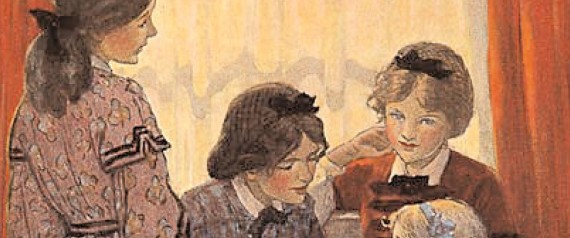
Christmas comes early on in this children's classic, but it's not a bountiful Christmas for the newly impoverished Marches. Still, the scene is heartwarming, full of the girls' desire to be happy with their small gifts and to even give up some of what little they have to make a merrier Christmas for a more destitute family:
Jo was the first to wake in the gray dawn of Christmas morning. No stockings hung at the fireplace, and for a moment she felt as much disappointed as she did long ago, when her little sock fell down because it was crammed so full of goodies. Then she remembered her mother's promise and, slipping her hand under her pillow, drew out a little crimson-covered book. She knew it very well, for it was that beautiful old story of the best life ever lived, and Jo felt that it was a true guidebook for any pilgrim going on a long journey. She woke Meg with a "Merry Christmas," and bade her see what was under her pillow. A green-covered book appeared, with the same picture inside, and a few words written by their mother, which made their one present very precious in their eyes. Presently Beth and Amy woke to rummage and find their little books also, one dove-colored, the other blue, and all sat looking at and talking about them, while the east grew rosy with the coming day.
War and Peace by Leo Tolstoy
This playful scene interrupts a rather tense and melodramatic family Christmas, but it's also unlike most festive holiday scenes we read, what with the unusual costumes and aristocratic veil of patronizing disdain thrown over the whole scene:
The mummers (some of the house serfs) dressed up as bears, Turks, innkeepers, and ladies -- frightening and funny -- bringing in with them the cold from outside and a feeling of gaiety, crowded, at first timidly, into the anteroom, then hiding behind one another they pushed into the ballroom where, shyly at first and then more and more merrily and heartily, they started singing, dancing, and playing Christmas games. The countess, when she had identified them and laughed at their costumes, went into the drawing room. The count sat in the ballroom, smiling radiantly and applauding the players. The young people had disappeared.
Half an hour later there appeared among the other mummers in the ballroom an old lady in a hooped skirt—this was Nicholas. A Turkish girl was Petya. A clown was Dimmler. An hussar was Natasha, and a Circassian was Sonya with burnt-cork mustache and eyebrows.
After the condescending surprise, nonrecognition, and praise, from those who were not themselves dressed up, the young people decided that their costumes were so good that they ought to be shown elsewhere.
Emma by Jane Austen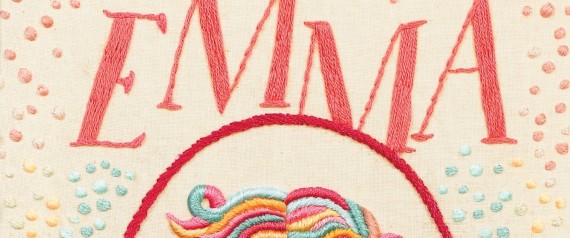
Christmas rarely figures significantly into Jane Austen novels, perhaps because they predated the Victorian era that established many of the season's most recognizable traditions. In this novel, however, a snowy Christmas party sets the scene for Mr. Elton proposing to Emma, to her great embarrassment, as she'd been attempting to make a match between him and her friend Harriet for months:
"Christmas weather," observed Mr. Elton. "Quite seasonable; and extremely fortunate we may think ourselves that it did not begin yesterday, and prevent this day's party, which it might very possibly have done, for Mr. Woodhouse would hardly have ventured had there been much snow on the ground; but now it is of no consequence. This is quite the season indeed for friendly meetings. At Christmas every body invites their friends about them, and people think little of even the worst weather. I was snowed up at a friend's house once for a week. Nothing could be pleasanter. I went for only one night, and could not get away till that very day se'nnight."
Mr. John Knightley looked as if he did not comprehend the pleasure, but said only, coolly,
"I cannot wish to be snowed up a week at Randalls."
At another time Emma might have been amused, but she was too much astonished now at Mr. Elton's spirits for other feelings. Harriet seemed quite forgotten in the expectation of a pleasant party.
A Christmas Carol by Charles Dickens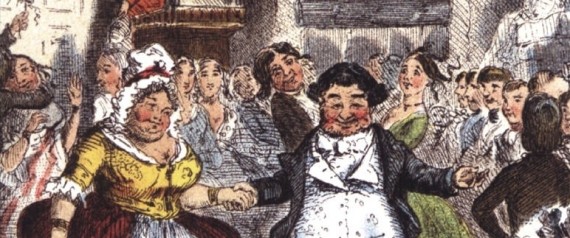
A Christmas essential, and one with a few memorable celebration scenes. Scrooge's Christmas morning change of heart is a rightfully popular one, but we also love this scene from Christmas Present; the family of Scrooge's poor clerk Bob Cratchit are eking out a lively Christmas despite the little they have:
There never was such a goose. Bob said he didn’t believe there ever was such a goose cooked. Its tenderness and flavour, size and cheapness, were the themes of universal admiration. Eked out by apple-sauce and mashed potatoes, it was a sufficient dinner for the whole family; indeed, as Mrs. Cratchit said with great delight (surveying one small atom of a bone upon the dish), they hadn’t ate it all at last! Yet every one had had enough, and the youngest Cratchits in particular, were steeped in sage and onion to the eyebrows! But now, the plates being changed by Miss Belinda, Mrs. Cratchit left the room alone—too nervous to bear witnesses—to take the pudding up and bring it in.
Suppose it should not be done enough! Suppose it should break in turning out! Suppose somebody should have got over the wall of the back-yard, and stolen it, while they were merry with the goose—a supposition at which the two young Cratchits became livid! All sorts of horrors were supposed.
Hallo! A great deal of steam! The pudding was out of the copper. A smell like a washing-day! That was the cloth. A smell like an eating-house and a pastrycook’s next door to each other, with a laundress’s next door to that! That was the pudding! In half a minute Mrs. Cratchit entered—flushed, but smiling proudly—with the pudding, like a speckled cannon-ball, so hard and firm, blazing in half of half-a-quartern of ignited brandy, and bedight with Christmas holly stuck into the top.
The Lion, The Witch and the Wardrobe by C.S. Lewis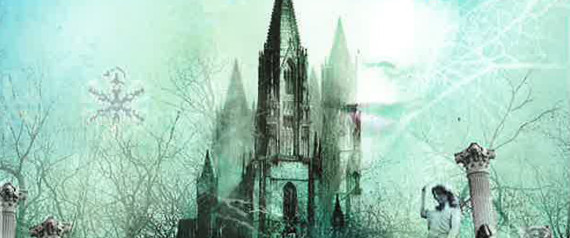
When the four Pevensie children enter Narnia, it's in the grips of the White Witch, who's made it always winter, but never Christmas -- a truly dark fate from the perspective of a child, especially. Father Christmas' appearance heralds the breaking of her spell, not to mention that he brings much-needed gifts for the children and the kind Beaver family:
"Didn't I tell you," answered Mr. Beaver, "that she'd made it always winter and never Christmas? Didn't I tell you? Well, just come and see!"
And then they were all at the top and did see.
It was a sledge, and it was reindeer with bells on their harness. But they were far bigger than the Witch's reindeer, and they were not white but brown. And on the sledge sat a person whom everyone knew the moment they set eyes on him. He was a huge man. in a bright red robe (bright as hollyberries) with a hood that had fur inside it and a great white beard, that fell like a foamy waterfall over his chest.
Everyone knew him because, though you see people of his sort only in Narnia, you see pictures of them and hear them talked about even in our world -- the world on this side of the wardrobe door. But when you really see them in Narnia it is rather different. Some of the pictures of Father Christmas in our world make him look only funny and jolly. But now that the children actually stood looking at him they didn't find it quite like that. He was so big, and so glad, and so real, that they all became quite still. They felt very glad, but also solemn.
Little House on the Prairie by Laura Ingalls Wilder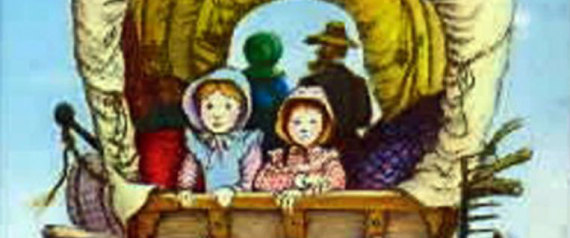
Life on the prairie wasn't always easy for Laura and her siblings, but that made their excitement at small treats all the more intense. On this Christmas morning, they awake to find their stockings full of small gifts that make them happier than extravagant toys make many children:
Something was shining bright in the top of Laura’s stocking. She squealed and jumped out of bed. So did Mary, but Laura beat her to the fireplace. And the shining thing was a glittering new tin cup. Mary had one exactly like it. These new tin cups were their very own. Now they each had a cup to drink out of. Laura jumped up and down and shouted and laughed, but Mary stood still and looked with shining eyes at her own tin cup.
Then they plunged their hands into the stockings again. And they pulled out two long, long, sticks of candy. It was peppermint candy, striped red and white. They looked and looked at that beautiful candy, and Laura licked her stick, just one lick. But Mary was not so greedy. She didn’t even take one lick of her stick.
Those stockings weren’t empty yet. Mary and Laura pulled out two small packages. They unwrapped them, and each found a little heart-shaped cake. Over their delicate brown tops was sprinkled white sugar. The sparkling grains lay like tiny drifts of snow.
Far From the Madding Crowd by Thomas Hardy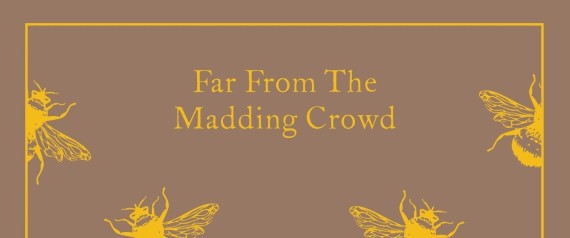
This elaborate Christmas bash in Hardy's novel doesn't end well (it is, after all, in a Hardy novel), and it has to be said that it doesn't start promisingly either. It has all the trappings of decked halls and Yuletide cheer, but none of the actual cheer:
Christmas-eve came, and a party that Boldwood was to give in the evening was the great subject of talk in Weatherbury. It was not that the rarity of Christmas parties in the parish made this one a wonder, but that Boldwood should be the giver. The announcement had had an abnormal and incongruous sound, as if one should hear of croquet-playing in a cathedral aisle, or that some much-respected judge was going upon the stage. That the party was intended to be a truly jovial one there was no room for doubt. A large bough of mistletoe had been brought from the woods that day, and suspended in the hall of the bachelor's home. Holly and ivy had followed in armfuls. From six that morning till past noon the huge wood fire in the kitchen roared and sparkled at its highest, the kettle, the saucepan, and the three-legged pot appearing in the midst of the flames like Shadrach, Meshach, and Abednego; moreover, roasting and basting operations were continually carried on in front of the genial blaze.
As it grew later the fire was made up in the large long hall into which the staircase descended, and all encumbrances were cleared out for dancing. The log which was to form the back-brand of the evening fire was the uncleft trunk of a tree, so unwieldy that it could be neither brought nor rolled to its place; and accordingly two men were to be observed dragging and heaving it in by chains and levers as the hour of assembly drew near.
In spite of all this, the spirit of revelry was wanting in the atmosphere of the house. Such a thing had never been attempted before by its owner, and it was now done as by a wrench.
Brideshead Revisited by Evelyn Waugh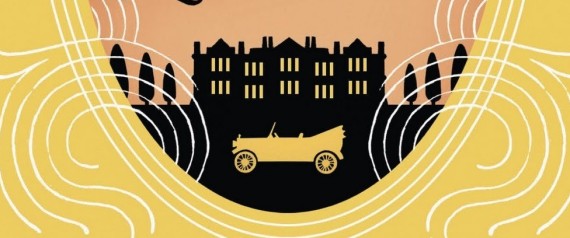
Brideshead Revisited follows a man who, among other things, fails utterly in his marriage and attempt at fatherhood, as his glancing memory of their Christmases together -- spent with his unpleasant relations -- suggests:
"Two Christmases" -- those bleak, annual excursions into propriety. Boughton, home of my family, home of my cousin Jasper, with what glum memories of childhood I revisited its pitch-pine corridors and dripping walls! How querulously my father and I, seated side by side in my uncle's Humber, approached the avenue of Wellingtonias knowing that at the end of the drive we should find my uncle, my aunt, my Aunt Philippa, my cousin Jasper and, of recent years, Jasper's wife and children; and besides them, perhaps already arrived, perhaps every moment expected, my wife and my children. This annual sacrifice united us; here among the holly and mistletoe and the cut spruce, the parlour games ritually performed, the brandy-butter and the Carlsbad plums, the village choir in the pitch-pine minstrels' gallery, gold twine and sprigged wrapping-paper, she and I were accepted, whatever ugly rumours had been afloat in the past year as man and wife. "We must keep it up, whatever it costs us, for the sake of the children," my wife said.
Great Expectations by Charles Dickens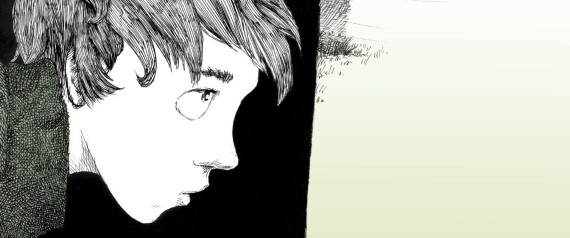
Charles Dickens has packed numerous Christmas scenes into his books, but this one has a wry humor that many of his more treacly holiday parties don't. In this, young Pip recounts the arrival of a ridiculous relative to Christmas dinner, an event many of us can surely relate to:
"Mrs. Joe," said Uncle Pumblechook, a large hard-breathing middle-aged slow man, with a mouth like a fish, dull staring eyes, and sandy hair standing upright on his head, so that he looked as if he had just been all but choked, and had that moment come to, "I have brought you as the compliments of the season -- I have brought you, Mum, a bottle of sherry wine -- and I have brought you, Mum, a bottle of port wine."
Every Christmas Day he presented himself, as a profound novelty, with exactly the same words, and carrying the two bottles like dumb-bells. Every Christmas Day, Mrs. Joe replied, as she now replied, "O, Un—cle Pum-ble—chook! This is kind!" Every Christmas Day, he retorted, as he now retorted, "It's no more than your merits. And now are you all bobbish, and how's Sixpennorth of halfpence?" meaning me.
We dined on these occasions in the kitchen, and adjourned, for the nuts and oranges and apples to the parlor; which was a change very like Joe's change from his working-clothes to his Sunday dress.
Anne of Green Gables by L.M. Montgomery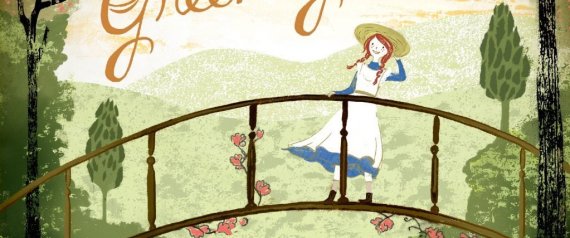
Unlike the March sisters, poor Anne had never had a real Christmas before we meet her as she's adopted by Marilla and Matthew. Though Marilla is cold and practical, Matthew can't resist spoiling the little girl, treating her to a relatively lavish present: a fashionable new dress:
"Merry Christmas, Marilla! Merry Christmas, Matthew! Isn't it a lovely Christmas? I'm so glad it's white. Any other kind of Christmas doesn't seem real, does it? I don't like green Christmases. They're not green -- they're just nasty faded browns and grays. What makes people call them green? Why -- why -- Matthew, is that for me? Oh, Matthew!"
Matthew had sheepishly unfolded the dress from its paper swathings and held it out with a deprecatory glance at Marilla, who feigned to be contemptuously filling the teapot, but nevertheless watched the scene out of the corner of her eye with a rather interested air.
Anne took the dress and looked at it in reverent silence. Oh, how pretty it was -- a lovely soft brown gloria with all the gloss of silk; a skirt with dainty frills and shirrings; a waist elaborately pintucked in the most fashionable way, with a little ruffle of filmy lace at the neck. But the sleeves -- they were the crowning glory! Long elbow cuffs, and above them two beautiful puffs divided by rows of shirring and bows of brown-silk ribbon.
"That's a Christmas present for you, Anne," said Matthew shyly.
Vanity Fair by William Thackeray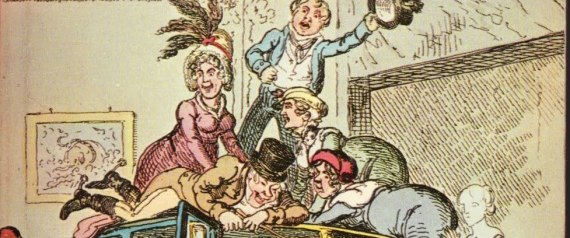
The protagonist of this sprawling novel is a cynical social climber -- not the kind of person who revels in Christmas sentimentalities. But as she travels with her husband and son to visit relatives one Christmas, we get a glimpse of both her and her small child's reactions to seeing the family home welcoming them for the holidays, making for a poignant contrast:
It was dark again when little Rawdon was wakened up to enter his uncle's carriage at Mudbury, and he sat and looked out of it wondering as the great iron gates flew open, and at the white trunks of the limes as they swept by, until they stopped, at length, before the light windows of the Hall, which were blazing and comfortable with Christmas welcome. The hall-door was flung open -- a big fire was burning in the great old fire-place -- a carpet was down over the chequered black flags -- "It's the old Turkey one that used to be in the Ladies' Gallery," thought Rebecca, and the next instant was kissing Lady Jane.
Harry Potter and the Sorcerer's Stone by J.K. Rowling
Like Anne Shirley, Harry hasn't had a real Christmas before -- the nasty Dursleys didn't care to indulge him. Children's literature abounds with great Christmas scenes because it's so fun to see the wonder of a child on Christmas morning, and even more so when it's a deserving kid like Harry who hasn't experienced the holiday properly before:
On Christmas Eve, Harry went to bed looking forward to the next day for the food and the fun, but not expecting any presents at all. When he woke early in the morning, however, the first thing he saw was a small pile of packages at the foot of his bed.
"Merry Christmas," said Ron sleepily as Harry scrambled out of bed and pulled on his bathrobe.
"You, too," said Harry. "Will you look at this? I've got some presents!"
"What did you expect, turnips?" said Ron, turning to his own pile, which was a lot bigger than Harry's.
The Mill on the Floss by George Eliot
When Tom returns from school for Christmas, in this book about fraternal love, he finds the holiday superficially unchanged but somehow less satisfying, perhaps due to his father's anxiety about business. The intrusion of real-world care into the simple childhood pleasure of Christmas is a painful rite of passage. But Eliot also beautifully lays the scene of Christmastime in their home, while reminding us that innocent childish happiness in it will fade:
And yet this Christmas day, in spite of Tom's fresh delight in home, was not, he thought, somehow or other, quite so happy as it had always been before. The red berries were just as abundant on the holly, and he and Maggie had dressed all the windows and mantlepieces and picture-frames on Christmas eve with as much taste as ever, wedding the thick-set scarlet clusters with branches of the black-berried ivy. There had been singing under the windows after midnight, -- supernatural singing, Maggie always felt, in spite of Tom's contemptuous insistence that the singers were old Patch, the parish clerk, and the rest of the church choir; she trembled with awe when their carolling broke in upon her dreams, and the image of men in fustian clothes was always thrust away by the vision of angels resting on the parted cloud. The midnight chant had helped as usual to lift the morning above the level of common days; and then there were the smell of hot toast and ale from the kitchen, at the breakfast hour; the favorite anthem, the green boughs, and the short sermon gave the appropriate festal character to the church-going; and aunt and uncle Moss, with all their seven children, were looking like so many reflectors of the bright parlor-fire, when the church-goers came back, stamping the snow from their feet. The plum-pudding was of the same handsome roundness as ever, and came in with the symbolic blue flames around it, as if it had been heroically snatched from the nether fires, into which it had been thrown by dyspeptic Puritans; the dessert was as splendid as ever, with its golden oranges, brown nuts, and the crystalline light and dark of apple-jelly and damson cheese; in all these things Christmas was as it had always been since Tom could remember; it was only distinguished, it by anything, by superior sliding and snowballs.

